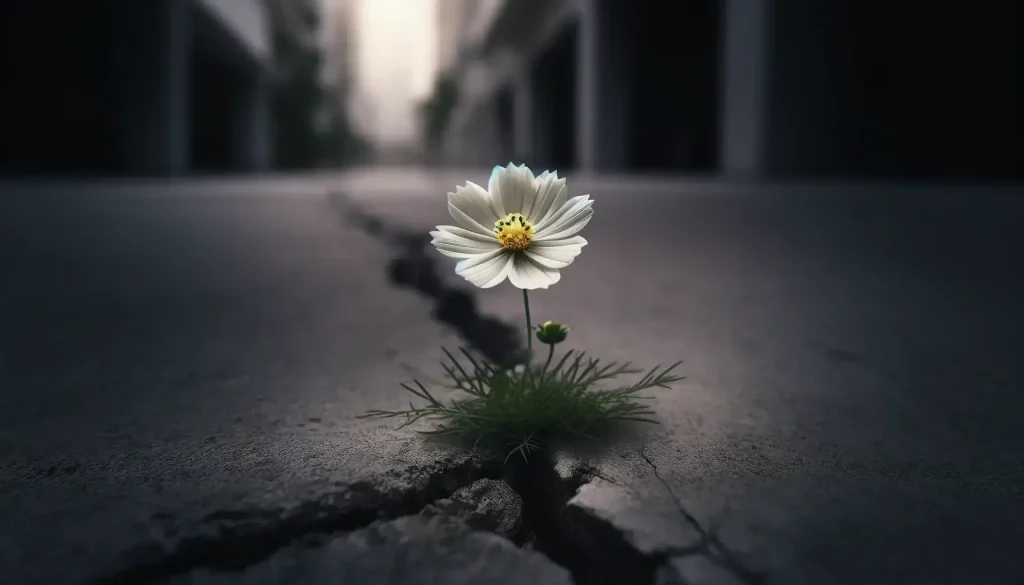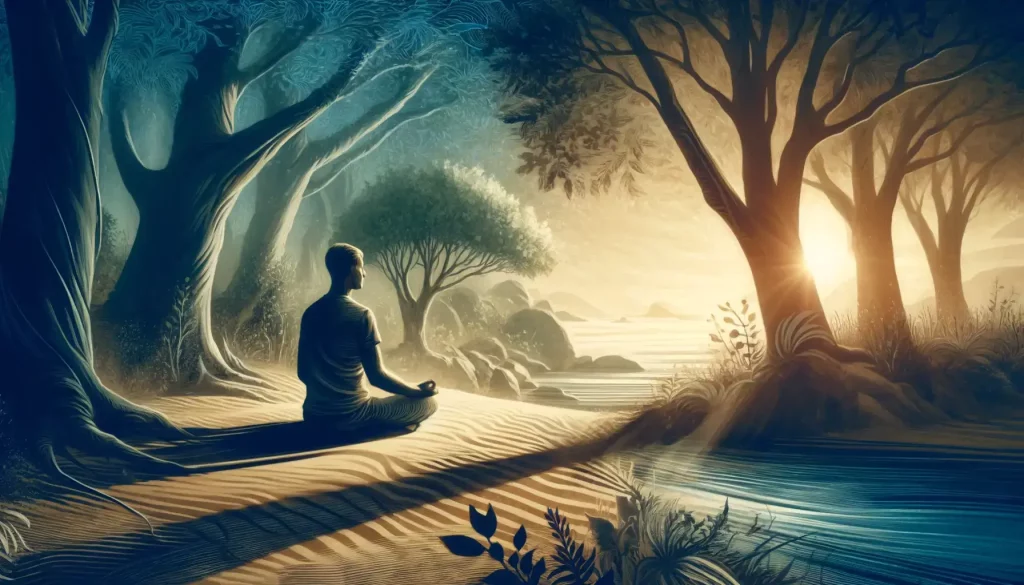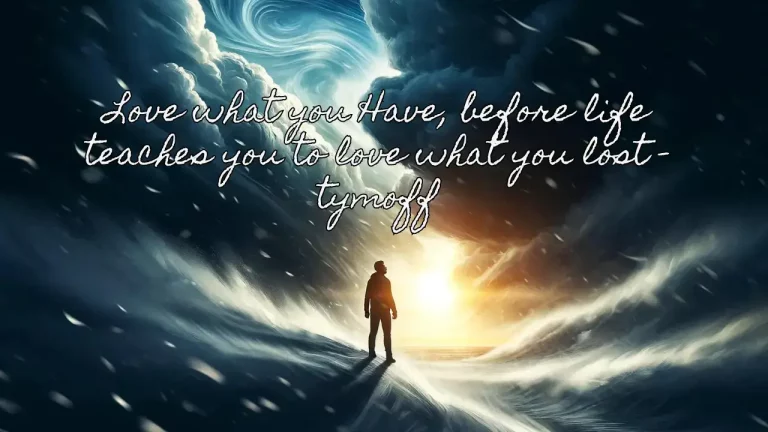love what you have, before life teaches you to lov – tymoff: Life has a way of teaching us lessons and making us realize the true value of things we’ve taken for granted. Tymoff’s thought-provoking phrase “Love what you have, before life teaches you to love what you lost” serves as a powerful reminder to cherish the present. This article explores how cultivating gratitude and mindfulness can lead to a more fulfilling life.
Table of Contents
Key Takeaways
- Practice mindfulness and gratitude daily to enrich awareness of life’s gifts already present.
- Keep a gratitude journal. Thank others often. Savor your senses fully.
- Cherish loved ones and ordinary moments. Don’t take the present for granted.
- Foster contentment by disconnecting from devices, helping people, and caring for yourself.
- Believe better days lie ahead during hard times. Healing begins by noticing the good.
- Spread gratitude outward to build more compassionate, generous communities.
- Teach children appreciation and wonder through modeling and gratitude habits.
- Happiness resides in embracing imperfection and loving whatever exists in your life today.
| Concept | Description |
|---|---|
| Mindfulness | Daily awareness of life’s gifts. |
| Cherishing | Appreciating moments & loved ones. |
| Contentment | Cultivating happiness in simplicity. |
| Resilience | Gratitude for coping and healing. |
| Community | Spreading kindness and compassion. |
| Teaching | Instilling appreciation in youth. |
| Joy | Embracing life’s imperfections. |
| Mindfulness Practice | Anchoring in the now. |
| Hard Times | Gratitude for resilience. |
| Global Contribution | Personal gratitude’s wider impact. |

What Does “Love What You Have Before You Lose It” Mean?
This meaningful quote encourages us to appreciate and find joy in what we already possess, before those things are lost or removed from our lives.
It’s easy to get caught up in the relentless pursuit of more in our materialistic world. But real contentment lies in appreciating the beauty, simplicity and richness of the present moment.
Tymoff advises us to savor the precious people and experiences within our reach right now. Life often requires a shift in perspective and a conscious effort to recognize the gifts we overlook in the chaos of chasing someday dreams.

Why Is Gratitude Important for Happiness?
Studies show that practicing gratitude consistently can dramatically improve both physical and mental health. Finding small ways to cultivate thankfulness each day serves as a powerful stress management tool. It reduces anxiety, increases optimism and helps us become more resilient.
Focusing on what we appreciate counters the human tendency to dwell on problems and desires. Expressing gratitude forces us to acknowledge the positive.
It makes us more attuned to life’s simple pleasures. By embracing an attitude of gratitude, we begin to change our overall perspective on life.
Research proves that keeping a gratitude journal, writing thank you notes or simply reflecting on things you are grateful for can make you happier and more fulfilled. Gratitude enriches life exponentially more than material possessions ever could.

Read More: How I sleep at night knowing l’m failing all my cl – tymoff 2024
How Can We Cherish the Present More Fully?
We cherish the present by bringing mindful awareness and gratitude to our everyday moments and routines. Here are some simple but meaningful ways to embrace the richness of now:
- Take time to really absorb the sights, sounds and sensations around you. Appreciate the ability to experience life.
- Express gratitude and affection to loved ones, even for small acts. Don’t take their presence for granted.
- Savor your morning coffee or tea. Thank yourself for prioritizing self-care.
- Pause to recognize the blessings behind mundane tasks like driving, washing dishes or brushing your teeth.
- Smile more. Allow yourself to be surprised by delight in unexpected places.
- Keep a gratitude journal. Jot down 3-5 things you appreciate about each day before bed.
- Perform small acts of kindness or express gratitude to others in your community.
These habits help ground us in the beauty of right now instead of constantly striving for more. Each moment holds unseen gifts if we’re willing to slow down and appreciate them.
How Can We Find Joy and Contentment in Everyday Life?
Lasting contentment comes from within. But we can cultivate it through daily habits and mindset shifts that help us discover fulfillment in the ordinary:
Practice gratitude – Start and end each day by reflecting on people, experiences or simple acts that enrich your life.
Unplug more – Reduce screen time to be present. Have in-person conversations. Go outside. Play. Read books. Craft.
Savor your senses – Eat mindfully. Pause to admire art and nature around you. Soak in music that moves you. Express yourself creatively.
Connect with loved ones – Share appreciation for people close to you. Offer support. Give hugs. Foster a spirit of community.
Care for yourself – Eat nutritious foods. Exercise. Get quality sleep. Take relaxing bubble baths. Treat yourself with compassion.
Help others – Perform acts of service in your community. Donate to or volunteer with organizations making a difference.
Find optimism – Reframe situations through a lens of hope instead of cynicism. Believe better times lie ahead, even in darkness.
Embrace imperfection – Remember that flaws and setbacks are normal and temporary parts of life’s journey.
With persistent practice, we can cultivate everyday contentment and joy. The present overflows with opportunities to appreciate life. Our attitudes shape our reality.

How Can Practicing Mindfulness Help Us Appreciate The Present?
Mindfulness means consciously bringing non-judgmental awareness to the present moment. Regular mindful meditation trains our brains to stay grounded instead of getting distracted by regrets, worries and future desires.
Setting a daily intention to be fully present takes practice but pays off exponentially in terms of life satisfaction. Mindfulness allows us to witness the world through fresh eyes, with childlike wonder. We can rediscover awe in things we’ve come to take for granted.
Slowing down to mindfully observe, listen and absorb makes everyday activities more vivid. Noticing beauty and meaning in ordinary moments fills life with gratitude. By anchoring in the now, we learn to truly appreciate whatever we have in this moment.

Why Should We Be Grateful Even During Hard Times?
Practicing gratitude during seasons of grief, loss or hardship may seem unrealistic or insensitive. However, cultivating thankfulness in difficult times can help us cope and heal.
Focusing on what we appreciate serves as an antidote to tunnel vision depression and anxiety. Expressing gratitude is a powerful act of hope that light exists, even in darkness. Keeping a gratitude journal during adversity grounds us in reasons to persevere.
Gratitude also makes us more resilient by enhancing optimism and connection. This mindset shift does not invalidate suffering – it simply helps us cling to the good still woven into the fabric of each day. Healing begins when we start gathering these remnants of joy and grace.
How Can Gratitude Contribute to The World?
Embracing gratitude not only enriches our personal lives, it also has the power to create positive ripple effects in communities. Recognition and appreciation are universal human needs. When we take time to acknowledge others, we foster more compassionate societies.
Grateful people are also more likely to “pay it forward” through generosity and service. Simply smiling more or thanking people we encounter can brighten their day. Finding ways to use our unique gifts to help others combats feelings of isolation and meaninglessness.
We can also ensure future generations learn to appreciate life by instilling gratitude in children. Teaching kids to thank, reflect and find wonder shapes their attitudes and priorities. Appreciation and service become intuitive when nurtured young.

Conlusion – love what you have, before life teaches you to lov – tymoff
In conclusion, “Love – Tymoff” and “Life teaches you to lov” encapsulate profound messages about appreciating our present circumstances and finding contentment in what we already possess.
These principles guide us to embrace the present moment, cherish the people and things we have in our lives, and foster a sense of gratitude and mindfulness.
Moreover, they underscore the importance of resilience — the ability to recover from difficulties and adapt to change.
By incorporating resilience, we not only appreciate and love what we have more deeply but also become better equipped to handle life’s inevitable challenges and lessons, ultimately leading to a more fulfilling and balanced existence.
FAQS
What inspired “Lov – Tymoff”?
“Lov – Tymoff” reflects Tim Tymoff’s insights into cherishing life’s current blessings and the fleeting nature of joy, urging a deeper appreciation for the present.
How does appreciating what we have impact daily life?
Appreciating what we have shifted focus to life’s abundance, fostering positivity and satisfaction, and enhancing overall well-being.
How does “Lov – Tymoff” promote resilience?
It fosters resilience by encouraging gratitude in adversity, strengthening adaptability, and helping individuals bounce back with a deeper appreciation for life.
Can Tim Tymoff’s philosophy lead to long-term happiness?
Yes, by emphasizing present appreciation and mindfulness, Tim Tymoff’s teachings pave the way for sustained happiness and a more fulfilling life journey

Kiara’s love for entertainment began with telenovelas and K-dramas, igniting a passion for international TV series and films. She holds a Master’s in Global Film Studies from NYU and has a penchant for dissecting cultural nuances in various entertainment forms. A champion of diversity and representation, Kiara believes that every voice, no matter how quiet, deserves to be heard. On weekends, she hosts viewing parties for the latest binge-worthy shows.

